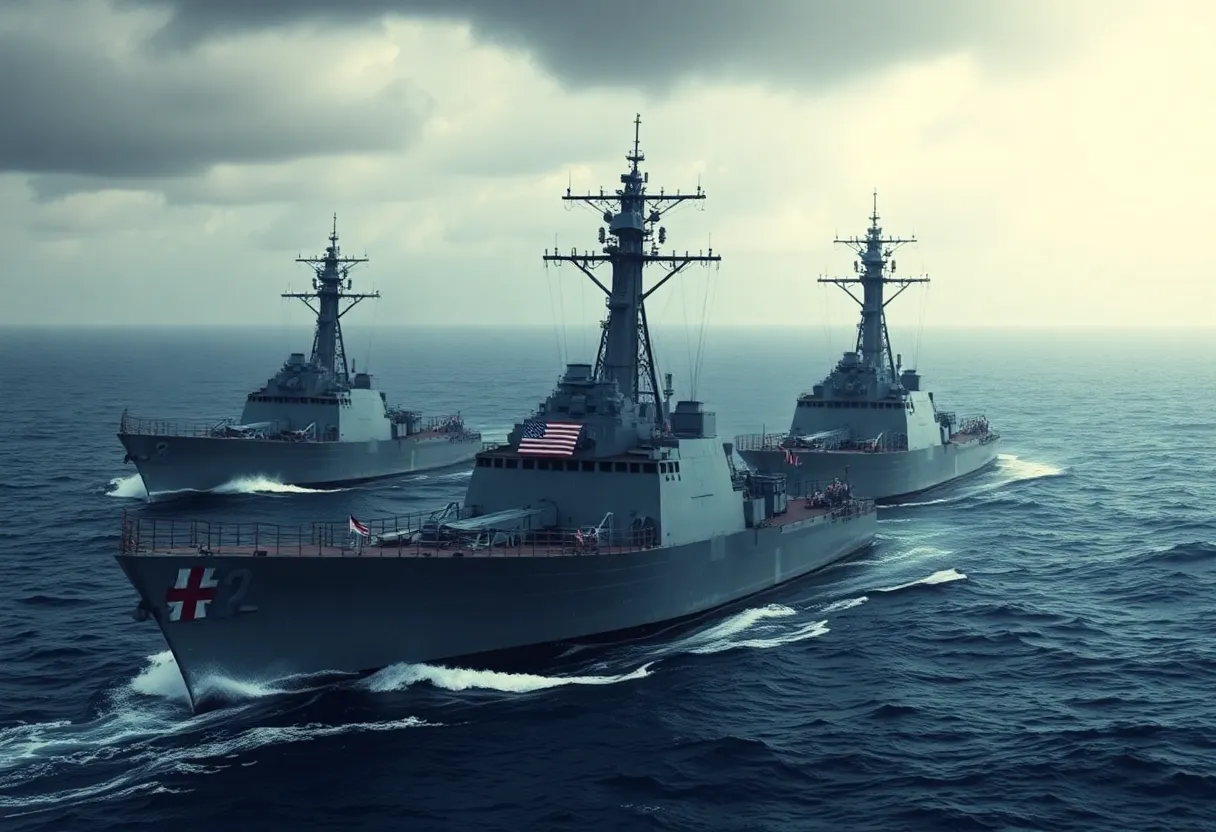News Summary
The U.S. has dispatched three Navy destroyers to the waters off Venezuela to combat drug trafficking, marking a significant escalation in tensions. With 4,000 military personnel ready, the move comes as Venezuela mobilizes 4.5 million militia members in response. The operation, framed as part of a broader war on drugs, underscores the deteriorating relationship between the U.S. and Venezuela, particularly after severe allegations against Venezuelan President Nicolás Maduro regarding drug trafficking. Observers are cautious of the implications as both nations prepare for potential escalation.
U.S. Navy Deploys Destroyers Near Venezuela: A New Chapter in Tense Relations
The waters off the coast of Venezuela are heating up as the U.S. sends three Navy destroyers in response to concerns over drug trafficking. The USS Gravely, USS Jason Dunham, and USS Sampson are now stationed nearby with around 4,000 U.S. military personnel ready to combat the rising tide of illegal drugs flowing from Venezuela.
Venezuela’s Response: Mobilizing Troops
In this backdrop, the Venezuelan government is not standing idly by. They’ve mobilized a staggering 4.5 million militia members to defend their territory. President Nicolás Maduro expressed a fierce commitment to protect Venezuela’s sovereignty, emphasizing that his country will not tolerate foreign interventions.
A War on Drugs
This naval operation has been framed as part of a larger U.S. effort to tackle the significant drug issue affecting American communities. The White House has made it clear that the administration is determined to use every resource available to address this crisis. Suspicion surrounds Maduro’s government, which has been accused of complicity in drug trafficking and is considered by some to be a key player in the global drug trade.
Political Undercurrents
The relationship between the U.S. and Venezuela has been strained for years. The U.S. has not recognized Maduro’s last two election victories, labeling his presidency as illegitimate. President Trump has gone as far as to describe Maduro as a dictator, blaming him for the influx of drugs and criminals into the United States. Sanctions were imposed during Trump’s first term, aiming to squeeze the Maduro regime’s finances and power.
Severe Allegations
Maduro himself has been under intense scrutiny. He was indicted in a New York federal court in 2020 on charges of narco-terrorism and conspiracy to import cocaine. Recently, the U.S. even increased its reward for information leading to his arrest to a whopping $50 million. These types of sanctions and accusations have painted an unflattering picture of the Venezuelan leader, making it difficult for any diplomatic reconciliations to take place.
Additional Military Forces
To further bolster this mission, the Pentagon has announced the deployment of additional military resources. This includes P-8 reconnaissance aircraft and a nuclear-powered attack submarine aimed at gathering intelligence and conducting operations in the area.
Maduro’s Denial
On his part, Maduro has vigorously rejected the U.S.’s charges, framing them as indicative of a failure in American policy rather than reflecting any truth about his administration’s actions. He has also pointed out the lack of evidence linking his government to drug cartels, including claims made about ties with Mexico’s Sinaloa Cartel, which the Mexican government has denied.
Temporary Measures and Future Implications
In light of rising tensions, the Venezuelan government has even imposed a temporary ban on the purchase and operation of drones in its airspace. This follows a previous assassination attempt on Maduro using explosive-laden drones. Such measures highlight the precariousness of the current situation, as both the U.S. and Venezuelan leadership brace for potential escalation.
The Road Ahead
As the U.S. Navy maintains its presence near Venezuelan waters, all eyes are on how this military operation will develop. The increased military readiness serves as both a warning and a proactive approach in combating drug trafficking that has been a severe drain on American society. The ongoing struggle for influence and the fight against narcotics threatens to deepen the rift between these two nations, leaving many wondering what the next chapter will entail in this complex and dangerous saga.
Deeper Dive: News & Info About This Topic
- Time: U.S. Navy Deploys Destroyers Near Venezuela
- Google Search: Venezuela militia
- Latin America Reports: Warships Toward Venezuela
- Wikipedia: Drug trafficking in Venezuela
- Miami Herald: U.S. Navy’s Actions in Venezuela
- Encyclopedia Britannica: Venezuela
- Fox News: U.S. Warships Patrol International Waters
- Google News: U.S. Navy deploys destroyers Venezuela
- Bloomberg: U.S. Sends Warships Toward Venezuela
- Zona Militar: U.S. Navy Destroyers Deployed

Author: STAFF HERE ORLANDO WRITER
ORLANDO STAFF WRITER The ORLANDO STAFF WRITER represents the experienced team at HEREOrlando.com, your go-to source for actionable local news and information in Orlando, Orange County, and beyond. Specializing in "news you can use," we cover essential topics like product reviews for personal and business needs, local business directories, politics, real estate trends, neighborhood insights, and state news affecting the area—with deep expertise drawn from years of dedicated reporting and strong community input, including local press releases and business updates. We deliver top reporting on high-value events such as Orlando International Fringe Theatre Festival, Megacon Orlando, and Central Florida Fair. Our coverage extends to key organizations like the Orlando Economic Partnership and Hispanic Chamber of Commerce Metro Orlando, plus leading businesses in leisure and hospitality that power the local economy such as Walt Disney World Resort, AdventHealth, and Universal Orlando. As part of the broader HERE network, including HEREJacksonville.com, HEREPetersburg.com, HERETallahassee.com, and HERETampa.com, we provide comprehensive, credible insights into Florida's dynamic landscape.





